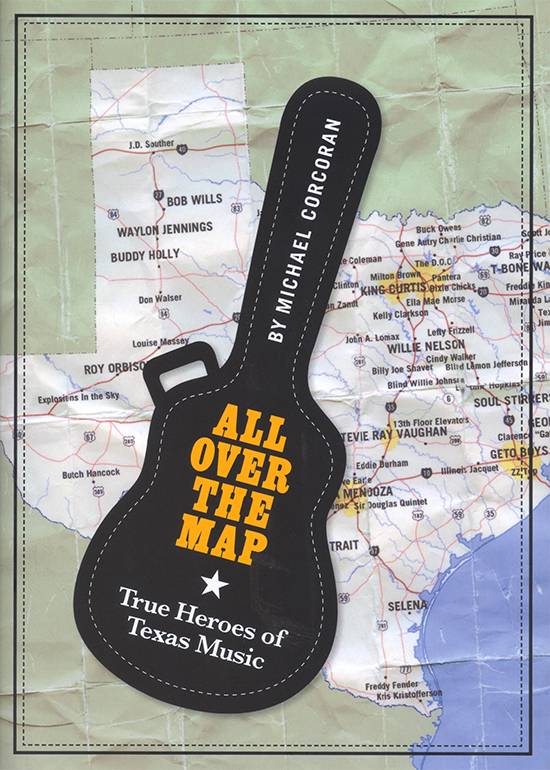Texas Me

All Over the Map: True Heroes of Texas Music
By Michael Corcoran
Denton: University of North Texas Press, 2017.
304 pp. $29.95 cloth.
Reviewed by
Jason Mellard
Michael Corcoran telegraphs the thesis of All Over the Map: True Heroes of Texas Music across three sentences on the first page of the preface. First: “No state is more musical than Texas, whose very geography seems to hum.” Second: “Texas is a state of immigrants, with a geography as diverse as its people.” And, finally: “A myth stoked by big hair, big cars, and loud proclamations has been made real by musical pioneers.” He might also have added that this alchemy of transforming the mythic into the real has not been a feat simply for the stars—the Willies and Beyoncés of the Texas firmament—but the work of everyday men and women called to make extraordinary art. Corcoran does not need to state this outright, perhaps, because he demonstrates the proposition on every page. Geography organizes the book, with sections covering East, West, and South Texas as well as the metropolitan areas of Dallas-Fort Worth, Waco, Houston, and Austin. Each section consists of short biographies of pivotal, but often unrecognized, musicians.
All Over the Map is an expanded edition of a book Corcoran originally published with the University of Texas Press in 2005. Such new editions are not always necessary, often consisting of a mere lengthening of the author’s initial effort. However, the new All Over the Map is a different breed, catching Corcoran in a moment that has expanded the horizons of his research. Where the original book serves as a kind of anthology of Corcoran’s accomplished career as journalist and music critic, this new edition captures the increasing heft of his historical sleuthing. As such, it extends the revelations of his recent work in reissuing and contextualizing the recordings of black gospel pioneers in Texas, He Is My Story: The Sanctified Soul of Arizona Dranes and the award-winning Dust to Digital project Washington Phillips and His Manzarene Dreams. If you need any other reasons to revisit the book, DJ Stout’s full redesign adds considerably to the volume’s appeal.
On the face of it, a book that consists solely of artist profiles in series could appear repetitive after a few chapters. All Over the Map does not, in part due to Corcoran’s sense of what makes a good story, but also because these serial profiles together begin to form a composite portrait of Texas music. The stars make appearances when Corcoran feels there is an element of their story that needs reframing. So, we hear about Stevie Ray Vaughan, Janis Joplin, Ray Price, Selena Quintanilla-Pérez, and Lefty Frizzell. The core of the book, though, is in the unsung heroes of the music.
The book opens with the story that first whetted Corcoran’s appetite for historical research: Houston singer Rebert Harris of the Soul Stirrers, the man who preceded and influenced Sam Cooke. The chapters that follow cover everyone from producer Tom Wilson, an African-American man from Waco behind seminal works by Bob Dylan, the Velvet Underground, and Sun Ra, to Mansfield’s Ella Mae Morse, a white jazz vocalist who furthered the career of Nat King Cole. There’s the Milt Larkin Orchestra that incubated the Texas tenor sax sound associated with the bands of Count Basie and Lionel Hampton, and the Toronados, the group that provided the sonic architecture for Houston’s Archie Bell & the Drells. Corcoran also delivers a rare turn in the spotlight for pianist Bobbie Nelson, Willie Nelson’s longest-running musical collaborator, and he unpacks the gospel and western career of the Chuck Wagon Gang who recorded in the same 1936 San Antonio sessions as blues legend Robert Johnson. The list goes on and on and on.
This is a book that embraces both Ernest Tubb and the Butthole Surfers, Lydia Mendoza and DJ Screw, and its wide net furthers our sense of just what constitutes “Texas Music.” Even as the author consciously makes this a representative work in terms of ethnicity, geography, and genre, it still bears the stamp of Corcoran’s deep ties to the Austin music scene. This lends an intimacy and poignancy to profiles of figures Corcoran has known personally, as well as those who have recently passed: the torrid young rockabilly Nick Curran, blues king Clifford Antone, SXSW ambassador Brent Grulke, and Stephen Bruton, to whom the book is lovingly dedicated. Corcoran’s map of Texas music is not simply a work of superficial cartography. It has depth and dimension that honors the profound resonance of its subject. Rather than truly being all over the map, then, the book stands firmly rooted in place. And so, even as an expanded reissue of a recent work of music history, All Over the Map constitutes an indispensable addition to the literature and secures Corcoran’s place among Texas music’s best chroniclers.
Jason Mellard is the Assistant Director of the Center for Texas Music History and a Lecturer in the History Department at Texas State University.
